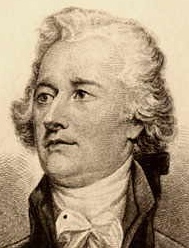 Adversaries
Adversaries 

What is the nation's political tradition?
| Monarchist | Populist |
|---|---|
Hamilton |
Jefferson |
Your people, sir, is a great beast. (1792) |
Whenever the people are well-informed, they can be trusted with their own government; whenever things get so far wrong as to attract their notice, they may be relied on to set them to right. (1789) |
| All communities divide themselves into the few and the many. The first are rich and well born; the other, the mass of the people. (1787) | Men... are naturally divided into two parties. Those who fear and distrust the people... Those who identify themselves with the people, have confidence in them, cherish and consider them as the most honest and safe... depository of the public interest. (1824) |
| Right wing | Left wing |
| commercial interests | agrarian interests |
| strong central government | states rights' supremecy |
| military supremecy for national security | a well trained citizen's militia |
| funding for internal improvements | limited government |
| high protective tariffs and monopoly | laissez faire economic policy of competition |
| Federal water diversion projects | National survey system for land |
| Reclamation and Flood Control | Acreage limitations for receiving federal water |
Electricity, urbanization, and World War One changed these nineteemth century ideological divisions.
Multi-polarity in conceptualizing political views
Authoritarian Constitutional |
|||
Left Wing
|
Right Wing
|
||
radical |
Liberal | Conservative |
reactionary |
Bill of Rights Libertarian |
|||
This page was created, by J. Siry.


